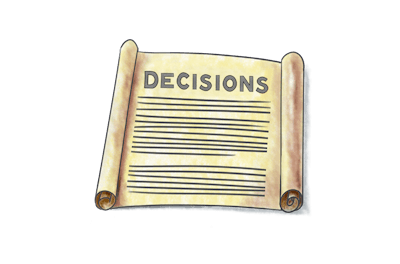I seem to make a lot of decisions. Decisions as a business owner, business partner, husband and father.
I’d like to make good decisions. By that I mean decisions that have more upside than downside. Decisions where the probability of expected value is higher than the probability of expected loss.
Most decisions I make feel like a “good” decision at the time. Yet fast-forward a few months when the outcome of the decision is apparent and I can’t remember the context and assumptions I based the decision on. This started to feel like a massive hole in my decision making skillset.
How would I know if the decision really was the right one? And how could I make better decisions in the future?
In January I stumbled across the concept of a decision journal on Shane Parrish’s blog, Farnam Street. It’s a simple idea that’s levelled up my decision making.
When you’re about to make a big decision, you list out the context and assumptions surrounding the decision you’re making. And then six months later, you review the outcome against how you thought it would turn out.
I’ve used the decision journal for business decisions such as hiring and strategic focuses, and for personal decisions such as moving banks, and choosing a super fund.
After 8 months of using the decision journal, four benefits have stood out to me.
Listing assumptions
When I’m excited about something, I find it easy to make a quick decision. In doing so I can be oblivious to the assumptions I’m making that underlie the decision.
Forcing myself to stop and list them out has been an eye opener. There’s usually at least one big assumption that when I see it written down I think “what happens if that isn’t accurate?”. This usually reins my excitement in, as I realise I need to invest time in exploring the assumption a little further.
Sourcing alternatives
Similar to above, if I find something I like I typically just go for it, regardless of alternatives. So I’m trying to be clear about any alternatives that I’ve considered but didn’t choose. And why I didn’t choose them.
It’s also a reminder that actively looking for alternatives is part of the process. It’s not enough to think “this direction feels right, I’m just going to go with it.”
There are often a bunch of assumptions tied in here too, that I need to unravel.
Considering probabilities
This was new for me, though once I thought about it it seemed pretty obvious. Related to assumptions, I find it easy to assume that something will work out for the best. Though I may not dig any further than that.
As Charlie Munger says, "If you don't get this elementary, but mildly unnatural, mathematics of elementary probability into your repertoire, then you go through a long life like a one-legged man in an ass-kicking contest. You're giving a huge advantage to everybody else.”
One easy formula I’ve been experimenting with is one that Ray Dalio uses to define expected value.
Expected value = reward x probability of occurring - penalty x probability of occurring
As Dalio says, “raising the probability of being right is valuable at any time.”
It’s not always easy to define the reward and penalty. But I find just going through the process of trying to define them beneficial – it highlights that I actually know less about the assumptions and expected outcome than I originally thought. And that I have more work to do before I make the decision.
Reviewing a decision six months later
Before I started using the decision journal, I never wrote decisions down.
Now that I do, it’s interesting returning to something I wrote six months ago. I review my assumptions, alternatives and expected outcome against what actually happened.
For me this is the most valuable step. I get insight into how I make decisions - how accurate my assumptions and probability outcomes are. And I can use the learnings straight away.

